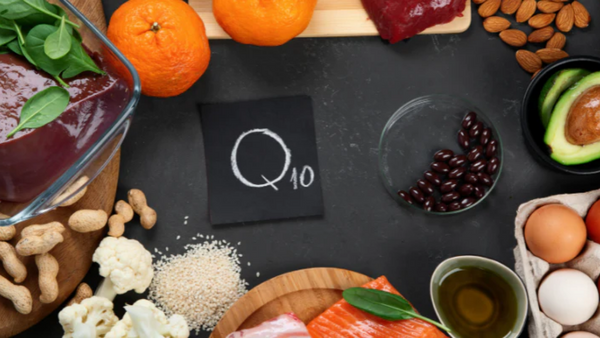Stress. Almost everyone of us knows the feeling. Originally nothing negative, it has now become a chronic condition for many. But that doesn't have to be the case. We will explain to you what stress is, what it can do to the body and how you can right nutrients can help to deal with it.
What is stress actually?
As a natural defense system against danger, stress causes the release of certain hormones that prepare your body to either avoid danger or face it (“fight or flight”). [1]
The body produces large amounts of cortisol, epinephrine - which you know as adrenaline - and norepinephrine. These substances then trigger the following reactions in the body:
- high blood pressure
- increased readiness of the muscles
- Sweat
- alertness
These reactions serve to improve your ability to respond to a potentially dangerous or challenging situation. Norepinephrine and adrenaline cause a faster heart rate.
Environmental factors that trigger this response are called stressors. Examples include noises, aggressive behavior, a speeding car, scary moments in movies, or even a first date. Feelings of stress tend to increase with the number of stressors.
IT'S WORTH READING!
AT THE END OF THE ARTICLE WE WOULD LIKE TO GIVE YOU A LITTLE JOY WITH A VOUCHER!

Types of stress
1. Acute stress
Acute stress happens to everyone. It is the body's immediate response to a new and challenging situation. It's the kind of stress you might feel if you narrowly escaped a car accident.
But even things that you enjoy can cause acute stress. For example, the frightening but nevertheless exciting feeling you get on a roller coaster or skiing down a steep mountain slope.
2. Episodic acute stress
Episodic acute stress means that you experience frequent episodes of acute stress.
This may be the case, for example, if you often feel anxious and worry about things you think might happen. You may feel like your life is chaotic and you seem to slide from one crisis to the next.
3. Chronic stress
If you are exposed to high levels of stress over a long period of time, it is chronic stress. Such long-term stress can have a negative impact on your health. For example, it can be the cause of the following diseases:
- Anxiety
- Cardiovascular diseases
- Depression
- High blood pressure
- a weakened immune system
Statistics from the insurance company Swiss Life from 2020 show that around 80 percent of Germans suffer from one of the three forms of stress. [2]
The effect of stress on your body
As mentioned, stress is not necessarily a bad thing. It helped our hunter-gatherer ancestors survive, and it is important today too. It can be healthy if it helps you avoid an accident, meet a tight deadline, or keep track of chaos.
We all feel stressed sometimes, but what a person finds stressful is different for each individual. One example is public speaking. Some people love the thrill, while others are paralyzed by the thought of it.
But stress should only be temporary. Once you get past the fight-or-flight moment, your heart rate and breathing should slow down and your muscles should relax. After a short time, your body should return to its natural state without any lasting negative effects.
Stress slows down some normal body functions, including digestive and immune system functions. When stressed, the body focuses its resources on breathing, blood flow, alertness, and preparing muscles for sudden action.
Under stress, the body reacts by:
- the increase in pulse and blood pressure
- accelerating breathing
- the slowing of the digestive system
- the decrease in immune activity
- the tension of the muscles
- increased alertness
The response to different stressors determines the impact on overall health. Some people can experience several triggers in succession or at once without causing a severe stress reaction.

Others may react more strongly to a single stressor. Of course, proper nutrition and healthy sleep play a key role in keeping our nerves healthy.
A 2018 analysis of studies found a link between work-related stress and coronary heart disease. However, the authors could not confirm the exact mechanisms by which stress causes coronary heart disease. [3]
Other studies have shown that people who perceive stress as negative for their health also have a higher risk of developing coronary heart disease than people who do not. [4]
7 nutrients that can help combat stress
Vitamins and minerals are important for many aspects of life, including mental performance and emotional health. [5] Certain nutrients called antioxidants such as vitamin A , vitamin C , vitamin E and selenium can help fight the cellular damage caused by free radicals.
1. B vitamins
The eight B vitamins , also known as vitamin B complex in various combinations, can improve your mood and reduce stress. They lower homocysteine levels or maintain healthy levels of this amino acid. [6]
High homocysteine levels are associated with stress and an increased risk of several diseases, including heart disease, dementia and colon cancer. [7]
B vitamins play an important role in metabolism by converting the food we eat into usable energy. They are also important for heart and brain health. [8]
A review of 8 studies involving 1,292 people showed that taking multivitamin and mineral supplements improved several aspects of mood, including stress and anxiety. [9]
In another 12-week study of 60 people suffering from work-related stress, those who took one of two forms of a vitamin B complex supplement experienced fewer work-related stress symptoms. [10]
Vitamin B complex supplements are generally safe when taken according to dosage recommendations. In addition, they are water-soluble, so the body excretes excess amounts in the urine. [11]
2. L-Theanine
L-theanine is an amino acid that is found in green tea, for example. It is said to have a relaxing effect, among other health benefits.
One study showed that taking supplements containing 200 mg of L-theanine could reduce measures of stress, such as heart rate, while performing a mentally demanding task. [12]
An analysis of 21 studies involving nearly 68,000 subjects found that green tea consumption was associated with reduced anxiety and improved memory and attention. [13]
It was concluded that these effects were due to the synergistic effects of caffeine and L-theanine in the tea, because each of the ingredients had a lesser effect on its own.
Another study of 34 people showed that 200 mg of L-theanine reduced levels of the stress hormone cortisol, which was released when completing a stressful multitasking task. [14]
3. Magnesium
Magnesium is a mineral that is involved in over 300 processes in the body, from the functioning of nerves and muscles to the synthesis of proteins and bones.
So far, research suggests that magnesium may be helpful for people with mild anxiety. A review of 18 studies published in May 2017 in the journal Nutrients found that magnesium supplements may improve stress and anxiety.
At the same time, she also pointed out that further research is needed before magnesium can be recognized as a stress reducer. [15]

4. Melatonin
As a natural hormone, melatonin regulates the body's circadian rhythm - the sleep-wake rhythm. The hormone level rises in the evening when it is dark and falls again in the increasing brightness of the morning.
A meta-analysis of 19 studies involving 1,683 participants who struggled with primary sleep disorders - those not caused by another medical condition - showed that melatonin reduced the time it took to fall asleep. In addition, overall sleep quality improved and total sleep duration increased. [16]
Another review of 7 studies involving 205 people examined the effectiveness of melatonin in treating secondary sleep disorders, that is, those caused by another condition such as stress or depression. The study showed that melatonin reduced the time it took to fall asleep and increased total sleep time, but did not significantly affect sleep quality compared to a placebo. [17]
5. Kava
Kava (Piper methysticum) is a tropical evergreen shrub native to the islands of the South Pacific. It has been consumed as a ceremonial drink since ancient times. Studies suggest that it may relieve anxiety due to its sedative effects, but more research is needed.
The plant contains active compounds called kavapyrones, which have been studied for their stress-reducing properties. Kava can be taken as a tea, capsule, powder, or liquid form. Its use appears to be safe when taken at a daily dosage of 120-280 mg of kavapyrones for 4 to 8 weeks. [18]
Kavapyrones are believed to inhibit the breakdown of gamma-aminobutyric acid (GABA), a neurotransmitter that reduces nervous system activity, producing a calming effect. This may help reduce feelings of anxiety and stress. [19]
6. Ashwagandha
Ashwagandha (Sanskrit: “smell of the horse”) is an adaptogenic herb native to India, where it is used in Ayurveda. [20]
In a study on the stress-relieving effects of Ashwagandha, 60 people suffering from mild stress symptoms took 240 mg of a standardized Ashwagandha extract daily for 60 days. Compared to placebo, taking Ashwagandha was associated with a greater reduction in stress, anxiety and depression.
Ashwagandha has also been linked to a 23 percent reduction in morning cortisol levels. [21]
7. Rhodiola rosea
Rhodiola rosea is an herb that grows in various regions in Russia and Asia. It is used to combat stress and is said to help with fatigue, depression and anxiety.
The adaptogenic properties of Rhodiola are linked to two powerful active ingredients of the herb – rosavin and salidroside. [22]
An eight-week study of 100 people suffering from chronic fatigue symptoms such as poor sleep quality and impaired short-term memory and concentration showed that taking 400 mg of Rhodiola extract daily improved symptoms after just one week. [23]
Rhodiola rosea is well tolerated and safe. [24]
Conclusion: Peace can come with food
Many factors, such as work, money, health or relationships, can cause stress.
However, there are several nutrients or supplements that have been linked to reducing stress symptoms, including Rhodiola rosea, melatonin and ashwagandha.
L-theanine, B vitamins and kava can also help increase the body's resistance to stress factors.
AS PROMISED, YOU WILL RECEIVE A 10% VOUCHER FOR OUR Vitamin B complex forte andMagnesium .
SIMPLY COPY THE CODE RELAX+V10 AND ENTER IT AT CHECKOUT.
Click here to SHOP
[1] https://www.ncbi.nlm.nih.gov/pmc/articles/PMC3056281/
[2] https://www.swisslife.de/ueber-swiss-life/presse/pressemitigungen/newsfeed/2020/11-18.html
[3] https://www.ncbi.nlm.nih.gov/pmc/articles/PMC6015274/
[4] https://academic.oup.com/eurheartj/article/34/34/2697/617400
[5] https://pubmed.ncbi.nlm.nih.gov/23362497/
[6] https://www.ncbi.nlm.nih.gov/pmc/articles/PMC4290459/
[7] https://pubmed.ncbi.nlm.nih.gov/18425703/
[8] https://www.ncbi.nlm.nih.gov/pmc/articles/PMC4772032/
[9] https://pubmed.ncbi.nlm.nih.gov/23362497/
[10] https://pubmed.ncbi.nlm.nih.gov/21905094/
[11] https://pubmed.ncbi.nlm.nih.gov/28716455/
[12] https://pubmed.ncbi.nlm.nih.gov/31758301/
[13] https://pubmed.ncbi.nlm.nih.gov/31758301/
[14] https://pubmed.ncbi.nlm.nih.gov/26797633/
[15] https://www.ncbi.nlm.nih.gov/pmc/articles/PMC5452159/
[16] https://pubmed.ncbi.nlm.nih.gov/23691095/
[17] https://pubmed.ncbi.nlm.nih.gov/29908879/
[18] https://pubmed.ncbi.nlm.nih.gov/29641222/
[19] https://www.ncbi.nlm.nih.gov/pmc/articles/PMC4917254/
[20] https://www.ncbi.nlm.nih.gov/pmc/articles/PMC3252722/
[21] https://pubmed.ncbi.nlm.nih.gov/31517876/
[22] https://www.ncbi.nlm.nih.gov/pmc/articles/PMC3541197/
[23] https://pubmed.ncbi.nlm.nih.gov/28219059/
[24] https://pubmed.ncbi.nlm.nih.gov/20378318/

















